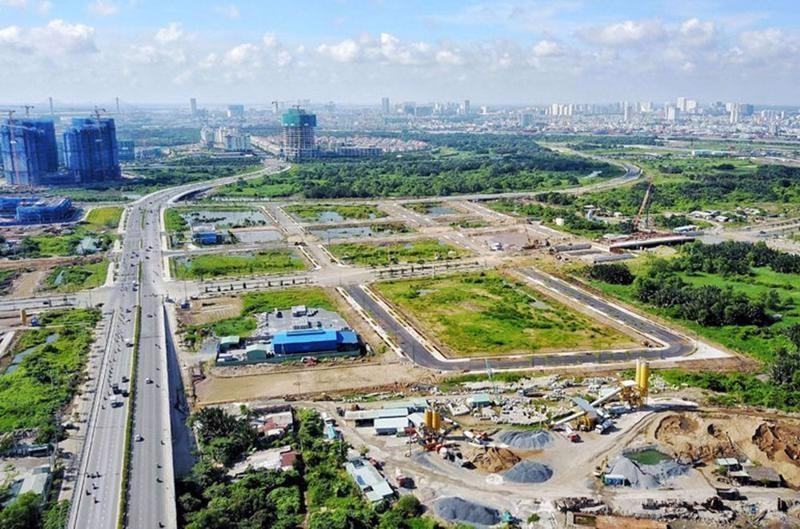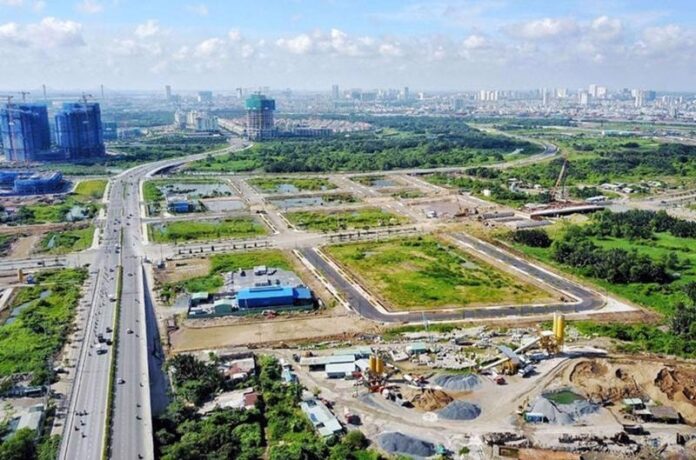
On May 26, 2025, the Ministry of Finance announced a call for comments on the draft decree amending and supplementing several articles of Decree No. 103/2024/ND-CP dated July 30, 2024, of the Government regulating land use fees, land rent, and Decree No. 104/2024/ND-CP dated July 31, 2024, of the Government on the Land Development Fund.
The most controversial issue in the draft is the retention of the regulation that cases with decisions on land allocation, land lease, land-use purpose conversion, conversion from annual land rent to one-time land rent, detailed planning adjustment, etc., before the effective date of the 2024 Land Law (August 1, 2024), but without decided land prices, must pay a supplement for the period without land use fees or land rent at a rate of 5.4%/year calculated on the amount payable.
Commenting on the supplementary land use fee regulation, Mr. Can Van Luc, a member of the National Financial and Monetary Policy Advisory Council, stated that this regulation is not truly suitable for reality and causes difficulties for enterprises. Therefore, the Ministry of Finance needs to adjust the supplementary land use fee collection to target the right subjects.
“I think it needs to be adjusted so that enterprises only have to pay supplementary land use fees when it is their fault; if it is objective or the cause is unclear, enterprises should not have to pay supplementary land use fees,” Mr. Luc emphasized.
Agreeing with this view, Prof. Dr. Dang Hung Vo, former Deputy Minister of Natural Resources and Environment, emphasized that the regulation on supplementary land use fee payment is not really reasonable for enterprises, especially in cases where enterprises “agree to receive land use rights” to implement investment projects. Because investors in real estate projects and commercial housing are not at fault for the state agency’s failure to issue land price decisions or land price schemes that have not been submitted to the People’s Committee with competent authority.
Discussing this issue, Lawyer Truong Thanh Duc, Director of ANVI Law Firm, opined that land belongs to the people, and the state represents the people in managing it. The state cannot give away or sell land cheaply, but it should not price it too high and exploit it to the maximum but needs to create favorable conditions for enterprises to access land, produce, and do business.
According to Lawyer Truong Thanh Duc, if the late land price determination is not due to the enterprise, the supplementary collection of 5.4% per year is unreasonable. Enterprises cannot decide the land price determination time, so the supplementary land use fee collection is incorrect. The state needs to coordinate reasonably instead of exploiting to increase costs and push up real estate prices.
“At present, the Government is calling for reducing house prices so that people have a chance to own houses. However, the regulation on supplementary land use fee collection inadvertently increases costs and pushes up real estate prices. This goes against the policy of supporting enterprises, such as tax reduction and land rent exemption under the current resolutions,” Mr. Duc emphasized.
Agreeing with this view, Ms. Nguyen Thanh Lich, Chairwoman of VNG Value Valuation Company, also said that the regulation of lumping all cases to pay supplementary land use fees is inappropriate. If enterprises violate or delay tax payment after receiving the notice, the surcharge is reasonable, but if the delay is due to state agencies, applying the rate of 5.4% per year is unfair.
According to Ms. Lich, the previous land allocation procedure did not involve auctions; the state gathered the land, allocated it to enterprises, and then calculated the land use fee. Enterprises only performed their obligations when they received the tax notice and could not pay proactively. The supplementary collection due to the delay of state agencies inadvertently causes double damage to enterprises, affecting their business plans and capital. Therefore, this draft needs to be amended to ensure fairness and support enterprise development.
In reality, many cases of delayed land price determination are not due to enterprises but to the slow action of state agencies. When a state agency decides to allocate land to an individual/enterprise, this is only the first step in transferring the land use right and does not fully entitle the land user.
Subsequently, the state agency must calculate the land price, the amount of tax/land rent, and until the land use fee is paid, the land user is not granted a certificate of land use rights and assets attached to the land and cannot fully enjoy their rights, such as construction, mortgage, pledge, deposit, wager, etc.
In these cases, it is unreasonable for individuals or enterprises to bear the land use fee and land rent at 5.4%. There are also cases where the land has been allocated to the investor, but for many years, the project has remained on paper, the land price has not been determined, and the amount that the land user has to pay is unknown. The enterprise also loses opportunities and cannot sell because it has to wait to complete its financial obligations.
Moreover, when a project lasts for many years, even decades, before the land use fee is calculated, the enterprise also faces increased costs. During the waiting period for land price determination, enterprises still have to bear interest expenses and opportunity costs.
Especially for projects with temporary land use fee calculations in the past, enterprises continue to face significant challenges with higher additional payments than initially expected, leading to the risk of losses. Evidence shows that many enterprises could not complete their financial obligations because they did not anticipate the high land use costs.
“Provincial Chiefs: The New Land Allocators – A Decision-Making Power Shift”
Let me know if you would like me to tweak it or provide other options!
“Addressing the concerns of the business community regarding land-related issues, Minister of Agriculture and Environment, Do Duc Duy, shared insightful news. In a bid to facilitate a more efficient process for businesses, the Ministry is crafting a decree on decentralization and delegation of authority. A key proposal within this decree is to transfer the authority of the Prime Minister to the Provincial People’s Committee Chairmen, a move designed to streamline decision-making and provide much-needed ease to entrepreneurs navigating land matters.”
Unlocking Opportunities: Government Pledges to Address Land, Procedural, Financial, and Infrastructure Hurdles.
The passionate pleas from the business community have been heard, and government officials have responded with concrete actions. They are committed to removing obstacles and creating an environment that is conducive to the growth of the private sector. This determination to turn the ambitious goals of Resolution 68 into a reality is evident in their efforts to improve institutional frameworks, streamline administrative procedures, and ensure sufficient resources for businesses.
The City of Ho Chi Minh Introduces Short-Term Land Lease Procedures
The People’s Committee of Ho Chi Minh City has issued Decision 71/2025/QD-UBND, outlining the process and procedures for leasing land and associated assets managed by the Ho Chi Minh City Land Development Center. This decision, effective from June 5, 2025, provides a comprehensive framework for short-term rentals, offering clarity and transparency to all stakeholders involved.





















